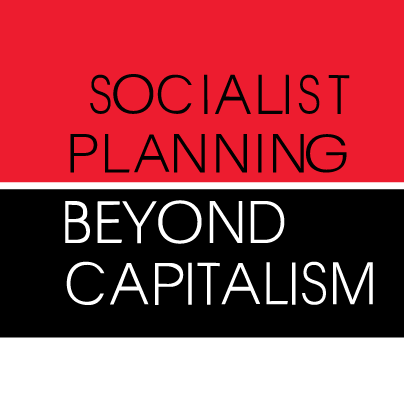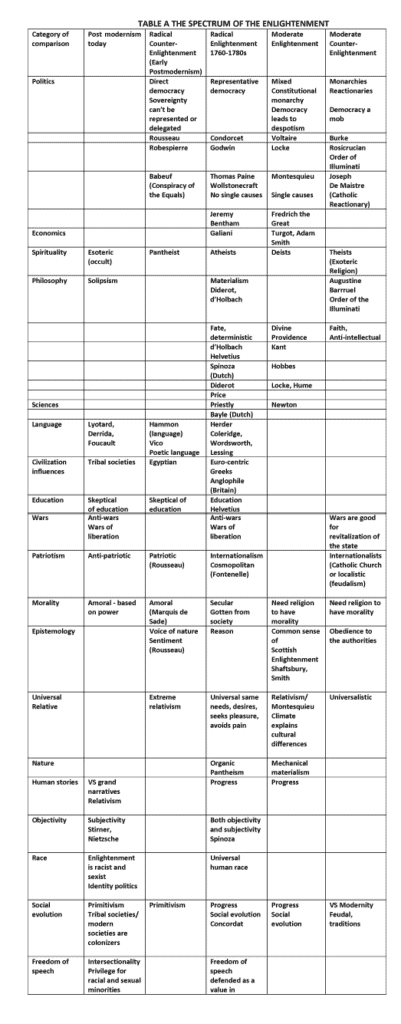Table A, the Spectrum of the Enlightenment, compares the Radical to the Moderate Enlightenment. I've left out a description of the Moderate Enlightenment in this article because it is well-known and because it is not on the main line of my argument. The Counter-Enlightenment is less well-known and interesting, but this is also not quite in line with the thrust of this article. Broadly speaking the Counter-Enlightenment is a movement of religious reactionaries who reject democracy, science and materialism. The Radical Counter-Enlightenment are for most part the forces to the left contributing to the French Revolution, typified by Rousseau and Robespierre. As a liberal, Israel wants to exclude revolutionaries from the Radical Enlightenment, but this categorization is confusing and not worth trying to sort out here. Again, Margaret Jacob does a good job of straightening things out. But to travel with her would take too much time. The most important part of Israel's implied categorization of the Radical Counter-Enlightenment is his claim that it is an early version of postmodernism. I've included some of the characteristics of postmodernism in the table (the leftmost column) even though the characteristics have not yet been discussed.
Postmodernism
Postmodernism adopts what I would call a cynicism when it comes the modernism that came out of the Enlightenment. Modernism is assumed to be foundationally racist and sexist. Its attitude to the remaining tribal societies is that of a colonizer. This involves claims to scientific objectivity, the power of reason, universal claims to truth and morality, traditional institutions, meaning Christianity. Postmodernism has been very preoccupied with the power of language to control people. Ironically, many postmodernists have some of their roots in western Marxism and various strains of anarchists. It is telling that Jonathan Israel has placed them in a category of the Counter -Enlightenment, linking them uneasily with conservative royalists who were also against the Enlightenment.
Among the earliest thinkers considered to be postmodern are the individualist anarchist Max Stirner and Friedrich Nietzsche, both of whom championed the individual against the pressures of science and capitalist. They were also connected to other movements in literary criticism like the symbolists. The values of post-modernist are relativity, diversity, subjectivity and the freedom of the individual "agency". It criticizes most leftism but still genuflects before Marx while not showing the slightest interest in political economy or organizing the working class.
Will Schnack has this to say about the postmodernist luminaries:
Lyotard
Jorge Luis Borges is among the most prominent influences in postmodern literature, but it would be Jean-Francois Lyotard who would be the first to put postmodernism to philosophical use. Lyotard, a literary theorist, had defined postmodernism as a rejection of "metanarratives," or the underlying stories and ideologies of modernity that assume the stability of concepts like "truth." Lyotard wanted to promote a sort of skepticism toward universal conceptions, suggesting Wittgenstein's notion of "language games" take the place of the notion of "truth." He believed that language, particularly what he called the "differend," was made impossibly difficult to communicate ideas within a thorough manner. His work would be "deconstructed" by another postmodernist, Jacques Derrida.
Derrida
Derrida, like many postmodernists, had a strong interest in language, particularly semiotics, but considered himself to be a historian. His approach, called deconstruction, was an attempt to challenge what he saw as unfounded assumptions of Western culture. He opposed the Western search for transcendental meaning, which he considered to be "logocentric."
Foucault
Michel Foucault was a literary critic who established a postmodern theory of power. He examined how language masked power relations which were then linked to knowledge systems.
The New Left and Postmodernism
Postmodern philosophy, in stressing subjectivity, has dovetailed nicely with the racial and identity politics of the New Left. Like the New Left it has abandoned the working class and any attempt at union organizing. At best, it has focused on single issues more of a cultural nature than political economy. Like the Frankfurt school, it has identified the university as the place where things happen. Like the New Left it has abandoned Marx's call to develop the productive forces for the life of a "slacker", more interested in preening and cultivating their "lifestyle".
(Note: You can view every article as one long page if you sign up as an Advocate Member, or higher).






